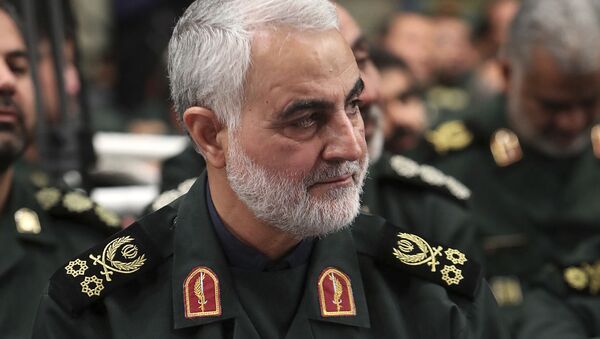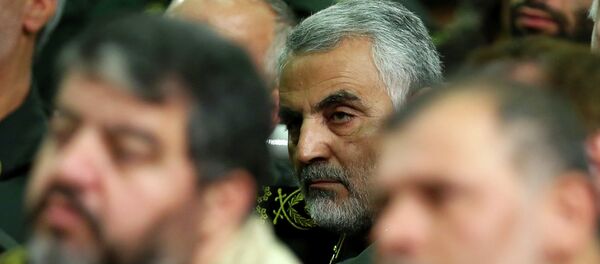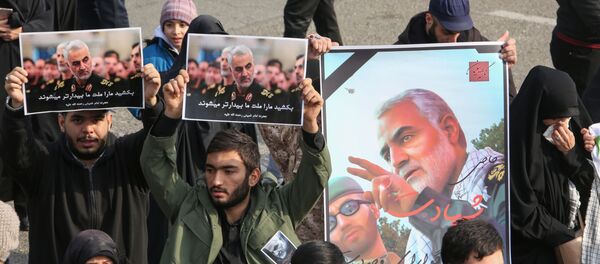The Jewish State's army is also on high alert, with the country's defence minister Naftali Bennett convening an urgent security cabinet meeting to assess the situation.
Dr Yossi Mansharoff, Iran and Shiite militia expert at the Jerusalem Institute for Strategy and Security (JISS) and Ezri Centre of Haifa University has shared his views on what repercussions Israel might face following the assassination of the top commander and one of the most influential people in Iran's leadership echelons.
Sputnik: Should Israel worry?
Yossi Mansharoff: Israel has been involved in different military campaigns against Iran in Iraq and Syria [i.e. targeting Iran's military facilities].
Now, Israel welcomes the American attack and the possible change that the elimination of Soleimani might make in the American strategy against Iran. In fact, Israel has been waiting for this change for a long time already.
Sputnik: But do you think Israel will see an attack emanating from Lebanon's Hezbollah?
Yossi Mansharoff: It could happen, but not from Hezbollah's side, which is embarrassed by the Lebanese protests. It is not a comfortable situation for them to attack Israel as it could lead to the political and military elimination of the organisation. Israel could retaliate to the attack and the Lebanese public could be angered by the move and Hezbollah's involvement.
Sputnik: How big of a blow is the assassination for Iran?
Yossi Mansharoff: It is a big shock for [the Supreme Leader] Khamenei and [Hezbollah chief Hassan] Nasrallah, and it is also a huge shock for their Shiite militias in Lebanon, Pakistan, and Afghanistan as well as Iran's allies such as President Bashar al-Assad of Syria and the Houthis in Yemen. Khamenei didn’t expect that President Trump would dare to do such a thing.
In the recent days you could see a call to eliminate Abu Mahdi al-Muhandis [an Iraqi military commander close to the Iranian Quds Force, who was also assassinated in last night's US attack]. That was the maximum many thought Trump would do, but they were wrong as Trump aimed much higher.
Sputnik: Was Israel involved in the attack?
Yossi Mansharoff: Initial reports suggest that Israel was involved, but we need time to understand whether that was actually the case.
Sputnik: If this is true and Israel did play a part in the assassination of Soleimani, what interests did it pursue?
Yossi Mansharoff: Iran has long been playing with fire when it comes to Israel. But that started a long time ago, even before Soleimani. Israel holds the previous commander of Quds Forces, Ahmad Vahidi, responsible for the killing of 85 Jews in the deadly Argentina bombing in 1994.
Soleimani replaced him at the end of 1997 and from that point on, he was responsible for the terror activities of Iran around the world. He didn’t act only against Israel but also against the Syrian people. Look what he has done there, where hundreds of thousands have died because of Iran.
But you cannot blame the Iranians for the war, as people die during a war regardless…
Yossi Mansharoff: He was responsible for the Iranian side and the Islamic Republic preferred to keep Asaad in power at the expense of the lives of millions of Syrians.
Sputnik: So what did he do to Israel to deserve such a fate?
Yossi Mansharoff: Soleimani was responsible for Hezbollah's operations and for the kidnapping of two of our soldiers in 2006, which eventually led to the Second Lebanon War. Hezbollah could not have done it without the substantial military, logistical, and financial support of Soleimani and Iran. They even admitted that they don't do anything without the permission of the Islamic Republic's supreme leader.
Sputnik: And now that he is gone, what reaction can we expect from Iran?
Yossi Mansharoff: Iran has a network of terror cells all around the world – in Africa, Europe, and the Americas and if Khamenei decides, Hezbollah can target any of these places.
Secondly, Iran could target American facilities like embassies in the Middle East or Africa and thirdly, Khamenei could decide to eliminate a high-ranking American official.
Sputnik: But do you think that the US, which is heading towards elections is interested in a war?
Yossi Mansharoff: No, I don’t. These elections were at the base of Khamenei's calculations when he ordered his Shiite militias to target Iraqi military bases hosting US personnel. Even the killing of the American contractor was rooted in the assumption that the US administration would not dare to get involved in any escalation with Tehran.
But now it seems that Trump has surprised Khamenei, who was not ready for such an option. And we have to see what the Iranian leader will decide to do. Khamenei should be very careful now because any uncalculated action against the US would drag Washington into a direct military escalation with Iran.
Sputnik: So do you think Iran would want to go to war to avenge the death of the top commander?
Yossi Mansharoff: The Iranian strategy says that Iran prefers not to be involved in any direct war but prefers to dispatch its proxies to do the job for them.
Sputnik: So you are saying they are afraid?
Yossi Mansharoff: Yes, as they are aware of their technological and military inferiority.
Sputnik: What's you assessment – was it a smart decision by Trump?
Yossi Mansharoff: I think that the change in the American strategy towards Iran should have been more gradual. The killing of Soleimani was a radial action by Trump.



